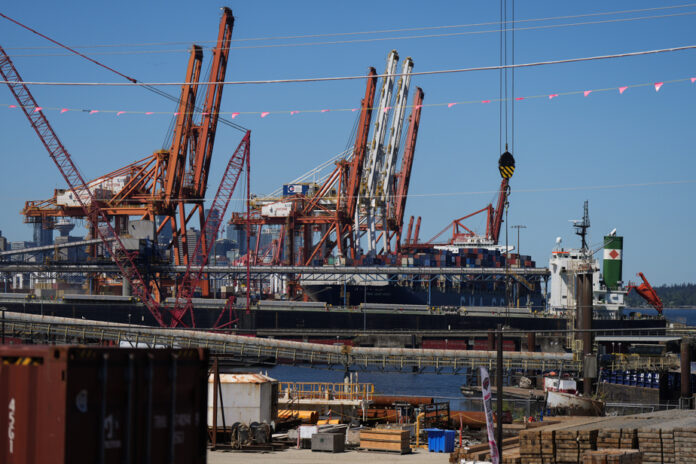The union representing Vancouver port stevedores withdrew the 72-hour strike notice it had filed hours earlier on Wednesday. In government, where patience has reached its limits – as in business – people are nevertheless careful not to claim victory.
“Effective immediately, the strike notice dated July 22 at 9 a.m. has been withdrawn,” Rob Ashton, president of the International Longshoremen’s and Warehousemen’s Union of Canada, said in a statement.
In Ottawa, Justin Trudeau convened the Incident Response Group on Wednesday afternoon to determine what the next steps might be. “The Prime Minister stressed that it was essential that activities resume as soon as possible in our ports,” read the minutes of the meeting.
And since “workers and employers across the country—and all Canadians—cannot face further disruption,” he asked ministers and senior officials to “consider all possible options to ensure the stability of our supply chains.”
Ministers Seamus O’Regan (Labour) and Omar Alghabra (Transport) are due to take stock this Thursday.
Neither the New Democratic Party nor the Bloc Québécois support the idea of a special law. Conservative Leader Pierre Poilievre did not elaborate on his position on the matter, preferring to challenge Justin Trudeau to announce “a plan to end this strike within the next 24 hours.”
Wednesday was punctuated with twists and turns. It began with a verdict from the Canada Industrial Relations Board (CIRB), which declared the strike “unlawful” under the Canada Labor Code, as the union side failed to give 72 hours’ notice.
In the business world, we watched the whole thing with a certain exasperation.
The first 13-day outage had already had “multi-million” repercussions at Olymel, which has accumulated about 3 million kilograms of fresh produce — such as pork tenderloins and loins — in its freezers.
“In a week, we’re going to approach 5 million kilos,” dropped the meat processor’s senior vice-president, Paul Beauchamp, on Wednesday. “If the strike had ended this morning, we would have had it until September [to sell off the stocks]. »
Asia is an important market for Olymel. Each week, approximately 1.5 million kilograms of fresh produce leave its factories in Quebec and Red Deer (Alberta) for countries such as Japan and South Korea.
These cargoes are shipped out of the Port of Vancouver, basically.
On the side of the representatives of employers’ associations, on Wednesday, we openly called for a special law. According to Véronique Proulx, president and CEO of Manufacturiers et Exportateurs du Québec (MEQ), Ottawa did everything to support the union and the employer during the first walkout.
“I don’t see what solution is left,” she said. We wanted a negotiated agreement, but there is a limit to letting companies be penalized. »
MEQ, which represents some 1,100 manufacturing companies in the province, estimates that “five to six days” are needed to “absorb the delays generated” by each day of the strike. At least 65 days will therefore be necessary to turn the page on the first 13 days of walkout.
Among financial analysts, the labor dispute at the Port of Vancouver does not worry in the short term. On the other hand, some, like Walter Spracklin of RBC Capital Markets, wonder if Canada’s reputation could be damaged. If so, the impact would go beyond exporting companies or those expecting goods from abroad.
“Labour uncertainty may cause shippers to re-evaluate their options, particularly to Midwest destinations, where Vancouver and Prince Rupert compete head-to-head with US West Coast ports,” Spracklin wrote. .
If this scenario were to materialize, the two major railways in the country, Canadian National (CN) and Canadian Pacific Kansas City (CPKC), could suffer. Approximately 40% of railcars moved by CN transit through the two western Canadian ports. For its competitor, it is around 20%.

